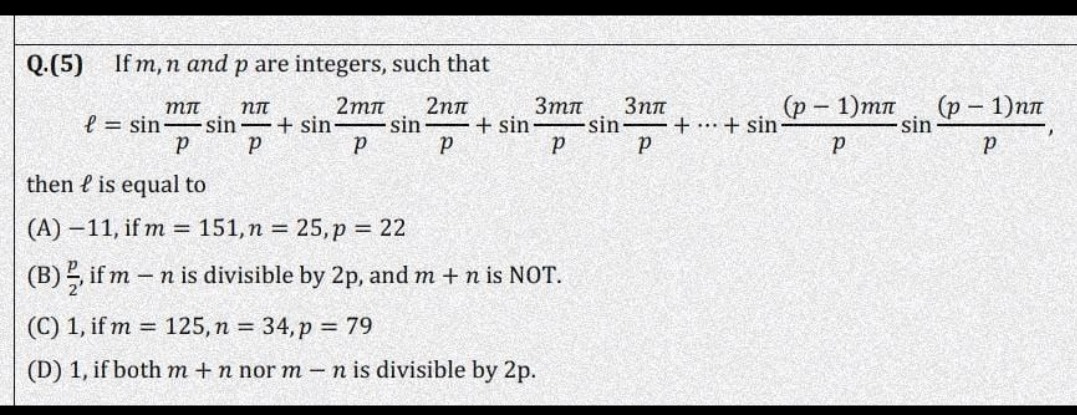Question
Question: If $m, n$ and $p$ are integers, such that $\ell = \sin\frac{m\pi}{p}\sin\frac{n\pi}{p} + \sin\frac{2...
If m,n and p are integers, such that ℓ=sinpmπsinpnπ+sinp2mπsinp2nπ+sinp3mπsinp3nπ+⋯+sinp(p−1)mπsinp(p−1)nπ, then ℓ is equal to

-11, if m=151,n=25,p=22
2p, if m−n is divisible by 2p, and m+n is NOT.
1, if m=125,n=34,p=79
1, if both m+n nor m−n is divisible by 2p.
A
Solution
The given sum is ℓ=∑k=1p−1sin(pkmπ)sin(pknπ) Using the product-to-sum identity sinAsinB=21[cos(A−B)−cos(A+B)], we get: ℓ=∑k=1p−121[cos(pk(m−n)π)−cos(pk(m+n)π)] ℓ=21[∑k=1p−1cos(pk(m−n)π)−∑k=1p−1cos(pk(m+n)π)] Let S(θ)=∑k=1p−1cos(pkθπ).
We analyze S(θ):
-
If θ is a multiple of 2p, θ=2jp for some integer j. S(θ)=∑k=1p−1cos(2jkπ)=∑k=1p−11=p−1.
-
If θ is an even integer, but not a multiple of 2p. Let θ=2j where j is not a multiple of p. Let z=eip2jπ. Then z=1 and zp=ei2jπ=1. S(θ)=Re(∑k=1p−1zk)=Re(1−zz(1−zp−1)). Since zp=1, ∑k=0p−1zk=0. So ∑k=1p−1zk=−z0=−1. S(θ)=Re(−1)=−1.
-
If θ is an odd integer. Let z=eipθπ. Then zp=eiθπ=(eiπ)θ=(−1)θ=−1 (since θ is odd). S(θ)=Re(∑k=1p−1zk). We know ∑k=0p−1zk=1−z1−zp=1−z1−(−1)=1−z2. ∑k=1p−1zk=1−z2−1. S(θ)=Re(1−z2)−1. Let x=pθπ. 1−z=1−cosx−isinx. Re(1−z2)=Re((1−cosx)2+sin2x2(1−cosx+isinx))=Re(2−2cosx2(1−cosx+isinx))=Re(1+i1−cosxsinx)=1. So, S(θ)=1−1=0.
Summary for S(θ):
- S(θ)=p−1 if θ is a multiple of 2p.
- S(θ)=−1 if θ is an even integer not divisible by 2p.
- S(θ)=0 if θ is an odd integer.
Evaluating the options:
(A) m=151,n=25,p=22. m−n=126. m+n=176. p=22, 2p=44. m−n=126 is even, not divisible by 44. S(126)=−1. m+n=176=4×44, divisible by 2p. S(176)=p−1=22−1=21. ℓ=21[S(126)−S(176)]=21[−1−21]=21[−22]=−11. Option (A) is correct.
(B) If m−n is divisible by 2p, S(m−n)=p−1. If m+n is not divisible by 2p: Case 1: m+n is odd. S(m+n)=0. ℓ=21[(p−1)−0]=2p−1=2p. Case 2: m+n is even, not divisible by 2p. S(m+n)=−1. ℓ=21[(p−1)−(−1)]=21[p]=2p. Since the outcome can be different, option (B) is incorrect.
(C) m=125,n=34,p=79. m−n=91 (odd). S(91)=0. m+n=159 (odd). S(159)=0. ℓ=21[0−0]=0=1. Option (C) is incorrect.
(D) If m+n and m−n are not divisible by 2p: Case 1: m−n and m+n are both odd. S(m−n)=0, S(m+n)=0. ℓ=21[0−0]=0. Case 2: m−n and m+n are both even, not divisible by 2p. S(m−n)=−1, S(m+n)=−1. ℓ=21[−1−(−1)]=0. In both cases, ℓ=0=1. Option (D) is incorrect.
